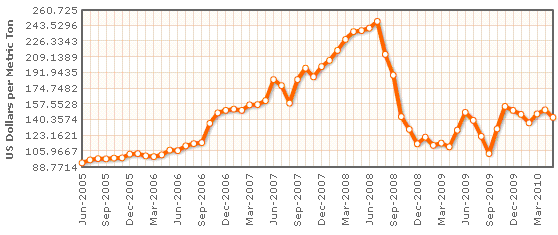- Is Beer a Commodity?
- The Monopoly of Beers
-
Do You Own the World’s Best
Brewer?
There’s an Egyptian proverb that says, “The mouth of a
perfectly happy man is filled with beer.”
And if you’re like me, you spent many days and nights of
your youth as a perfectly happy man. I’d like to invest in the
likelihood that tomorrow’s youth will continue drinking prodigious
quantities of beer.
Okay, so beer
technically isn’t a commodity. It’s a product – technically any good
that’s manufactured – but there are some investment implications that
relate directly to the prices of certain commodities. Could they be the
best “commodities?” I guess that’s a matter of opinion…
There are many commodities that go into making beer –
the most important being water, but also barley and hops.
To back up for a second: the thesis of this letter, one
that I’m constantly re-checking and analyzing for cracks and leaks, is
that commodity prices will advance while the broad market in stocks
continues to waver, and world currencies suffer from inflation.
So, in order to make profitable investments in beer,
it’s important to find a company that is able to gain a competitive
pricing advantage against its rivals. I believe that commodities will
rise in price, but I’m also equally certain that people (such as myself)
will continue to drink beer even in the worst case scenarios
imaginable.
If I were to
design the world’s most perfect beer company from the ground up, I’d want
it to be completely vertically integrated, with control over every aspect
of its production, distribution, and marketing.
It should have its own barley and hop farms, so that it
wouldn’t have to bid for these commodities on the open market.
Those two crops have experienced massive price swings
over the past 5 years. Poor hop-crop yields in 2007 and 2006 spurred
prices to rise ten-fold in 2008.
Barley prices also jumped: more than 200% between 2005
and 2008, from about $88 a metric tonne to over $241.
So a company that can control those costs by growing
their own supply has a distinct pricing advantage.
Ideally, I’d also want this brewery to have its own
shipping, bottling, marketing, and own all of its property.
If it’s not too much to ask, it would be great if this
brewery had instant global brand awareness synonymous with quality,
drinkability and consistency.
The other big costs for breweries are obviously energy
and labor – but without producing and refining oil, or inventing robots
that can do the jobs of men, there’s no way to significantly cut those
costs.
And today, there is such a company that has its own
barley and hop production, its own in-house shipping, bottling and
marketing sectors, and worldwide brand appeal.
I’mtalking
about Anheuser-Busch InBev (NYSE: BUD).
Yes, this company was acquired by Belgian booze giant
InBev, but it’s basically the same company.
And while I’m not a huge fan of their particular line-up
of beers, I love the company. It has five of the top ten selling beers in
the world, including Bud Light and Budweiser hanging on to the #1 and #2
spot.
That’s just a dominating product lineup. It’s so
impressive that there’s really no precedence for it.
BUD is one of those blue chip companies that should have
a place in everyone’s portfolio. And right now it’s a great way to play
rising commodity prices of all kinds. It already has a size advantage
over every other brewery on the planet – but beyond that, it can keep
production costs low because it’s vertically integrated. It’s probably
the closest thing to a monopoly in the world right now.
You should buy this company on any weakness.
Right now is the perfect time to buy BUD because it’s
close to its year-to-date lows. It’s currently selling for just over $48,
but if it dips below that mark, it’s a true bargain.
Normally I’d talk about some other relevant stocks in
the sector, but for my money I don’t think you can do any better.
The stock portfolio of a perfectly happy investor
probably has more than a few shares of BUD.
Good Investing,
Kevin McElroy
Editor
Resource Prospector
 Facebook
Facebook
 Twitter
Twitter
